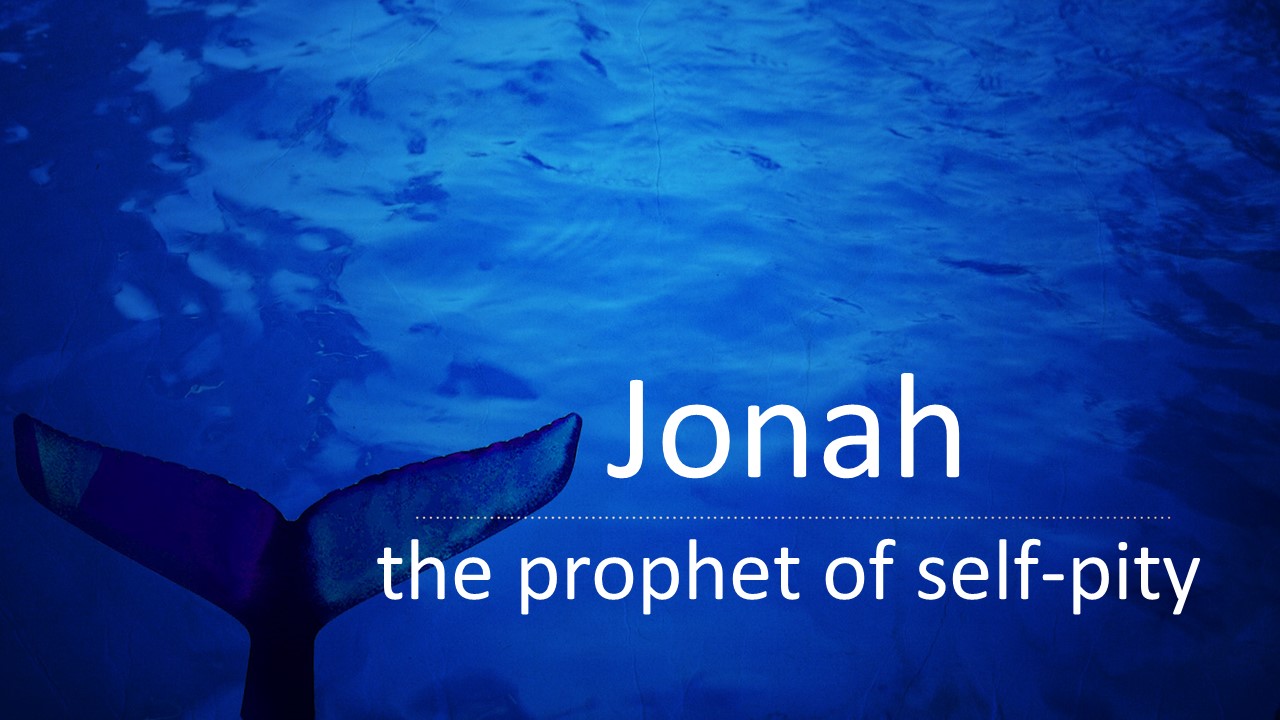The Love of God and Self Pity
 When we feel we aren’t loved, particularly by those closest to us, we are susceptible to self-pity. Perhaps others may have treated you harshly, spoken unkindly, or judged you unfairly. It’s easy to feel unloved in these situations. When it comes to defining love, our culture clearly puts the emphasis on what we feel. Statements like: I feel like I’m falling in love, and I don’t feel like I love you anymore reflect this error. Our inclination to interpret love by how we feel affects both how we think about others and how we think they think about us. This is one of the reasons that, in spite of all the biblical evidence that God loves us, some still choose to believe that he does not. They do not feel that he loves them.
When we feel we aren’t loved, particularly by those closest to us, we are susceptible to self-pity. Perhaps others may have treated you harshly, spoken unkindly, or judged you unfairly. It’s easy to feel unloved in these situations. When it comes to defining love, our culture clearly puts the emphasis on what we feel. Statements like: I feel like I’m falling in love, and I don’t feel like I love you anymore reflect this error. Our inclination to interpret love by how we feel affects both how we think about others and how we think they think about us. This is one of the reasons that, in spite of all the biblical evidence that God loves us, some still choose to believe that he does not. They do not feel that he loves them.
When feelings become your foundation, you are in a catch-22; you don’t like the way you feel, but you have chosen to let your feelings lead the way. Something will need to change if you are to break this endless cycle. The cycle is broken once you give love a biblical definition, not simply an emotional one. The Bible sees love as more of an action than an emotion. Consider Paul’s words to the Corinthians:
Love is patient and kind; love does not envy or boast; it is not arrogant or rude. It does not insist on its own way; it is not irritable or resentful; it does not rejoice at wrongdoing, but rejoices with the truth. Love bears all things, believes all things, hopes all things, endures all things. Love never ends.
The Greeks had five separate words to describe our one English word for love, so we should expect some ambiguity when we try to describe the word with our limited vocabulary. Of the five possible words, the one the New Testament writers most often chose was the Greek word agape. This word communicates a love of choice, commitment, and promise as opposed to an emotionally charged decision. The Bible teaches that we are to love one another in spite of how we feel. God doesn’t ask us to do what he himself has not done. The apostle Paul reminded the first-century Romans that while they were still God’s enemies, he showed his love to them through the death of his Son. True love will make similar sacrifices, regardless of how one feels. Because self-pity is driven by our feelings, a feelings-based love will be unable to defeat it. To overcome self-pity, you will need to focus on a commitment-based love.
This is precisely what the Father provided for Jesus in the darkest hour of his life. Jesus struggled emotionally in that final week of his life, but there is no record that he doubted his Father’s love. Rather, he seems to have interpreted everything through his unshakable confidence in his Father’s commitment. Six words reflect his security: as the Father has loved me. The historical context of those words should not be overlooked. Nearly a third of John’s gospel is devoted to the final hours of Jesus’ life before he is crucified. Humanity’s hatred and cruelty is directed at Jesus in those moments. His disciples are selfish; he is betrayed by a close friend; his trial is a travesty of justice; he is mocked, beaten, and spit upon. One might expect self-pity to run rampant given those circumstances. If we were in Jesus’ place, we might choose six different words: why is this happening to me or this is how you treat me? Not so with Jesus. In the middle of it all he states: as the Father has loved me. Jesus remembers the Father’s commitment to love him and his unchanging character that backs it up. Self-pity can’t bring its discontentment to the heart that is secure in the Father’s love.
Jesus’ six words of security are followed by five words of sacrifice:
As the Father has loved me, so I have loved you.
When we dwell upon the way that God loves us, we find inspiration to love others in spite of their treatment of us. Later in the conversation Jesus would qualify it further: “Greater love has no one than this, that someone lay down his life for his friends.” By looking to God’s love, we take our eyes off our self long enough to give our attention to others. In fact, this was Jesus’ final charge to his disciples just hours before he was nailed to the cross: “This is my commandment, that you love one another as I have loved you.” Jesus had a commitment-based love just like his Father, and he encouraged his followers do the same.
Have you ever wondered how Jonah’s story might have ended differently if he had focused on God’s love and not followed his feelings of self-pity? Perhaps there would have been a 5th chapter – one that spoke of Jonah rejoicing in his enemies’ repentance and giving praise for God’s gracious dealings with mankind. How might your life be different if you began to focus on the love of God? What if each time you began to feel sorry for yourself you reflected upon the love of God instead? When self-pity settles in, only a strong dose of God’s love will drive it out.
Taken from Dead-End Desire: biblical strategies for overcoming self-pity



 In self-pity we take our eyes off of God and focus them on ourselves—our circumstances, our difficulties, our weaknesses. It shouldn’t surprise us, therefore, that we aren’t making decisions with the glory of God in view. The final week of Jesus’ life is instructive. Ultimately it would be his commitment to the glory of God that guided his thoughts away from the trap of self-pity.
In self-pity we take our eyes off of God and focus them on ourselves—our circumstances, our difficulties, our weaknesses. It shouldn’t surprise us, therefore, that we aren’t making decisions with the glory of God in view. The final week of Jesus’ life is instructive. Ultimately it would be his commitment to the glory of God that guided his thoughts away from the trap of self-pity.
 Jonah winced under the noonday heat…As if to accentuate the silence of heaven, the only movement in the noon sky was a vulture rising effortlessly higher. Jonah shook his head in disgust and slumped down against a rock. His chin hit his chest, and he dozed. When he awoke, he noticed the beginnings of small plant behind him. A few days later the ground was covered in shadow, the vine’s branches reached over the rock. Finally! Jonah said to himself. Some shade for the faithful prophet. He turned his gaze back towards heaven and picked up the one-way conversation. That’s what I’m talking about, God. Giving people what they deserve. When I did wrong, you put me in the belly of a whale. But when I did what you asked, you paid with shade. He permitted himself a smile. Not the wages I was hoping for, but it’s a start. The shade temporarily cooled his internal resentment.
Jonah winced under the noonday heat…As if to accentuate the silence of heaven, the only movement in the noon sky was a vulture rising effortlessly higher. Jonah shook his head in disgust and slumped down against a rock. His chin hit his chest, and he dozed. When he awoke, he noticed the beginnings of small plant behind him. A few days later the ground was covered in shadow, the vine’s branches reached over the rock. Finally! Jonah said to himself. Some shade for the faithful prophet. He turned his gaze back towards heaven and picked up the one-way conversation. That’s what I’m talking about, God. Giving people what they deserve. When I did wrong, you put me in the belly of a whale. But when I did what you asked, you paid with shade. He permitted himself a smile. Not the wages I was hoping for, but it’s a start. The shade temporarily cooled his internal resentment.
 Exercise self-control. While analyzing, prioritizing and biblicizing are all necessary steps, exercising self-control with your daily decisions will be essential to overcome procrastination. This is the purpose of the phrase in the Ephesians 5:17 passage—“do not be foolish.” The fool in the Bible describes the one who should have known better, but did not. Despite being entrusted with the necessary knowledge to change, he stubbornly refused to live differently. He repeatedly did the same thing the same way, but for some reason expected a different result. This is a perfect description of the chronic procrastinator. In the past, he or she may have run out of time to give his or her best effort to the task or relationship, and though they should learn from such history, they sadly repeat the same error and run out of time again. The memory word to help the procrastinator make these necessary changes is the word exercise. In order to break his foolish habits, he will need to exercise three elements of self-control.
Exercise self-control. While analyzing, prioritizing and biblicizing are all necessary steps, exercising self-control with your daily decisions will be essential to overcome procrastination. This is the purpose of the phrase in the Ephesians 5:17 passage—“do not be foolish.” The fool in the Bible describes the one who should have known better, but did not. Despite being entrusted with the necessary knowledge to change, he stubbornly refused to live differently. He repeatedly did the same thing the same way, but for some reason expected a different result. This is a perfect description of the chronic procrastinator. In the past, he or she may have run out of time to give his or her best effort to the task or relationship, and though they should learn from such history, they sadly repeat the same error and run out of time again. The memory word to help the procrastinator make these necessary changes is the word exercise. In order to break his foolish habits, he will need to exercise three elements of self-control.



